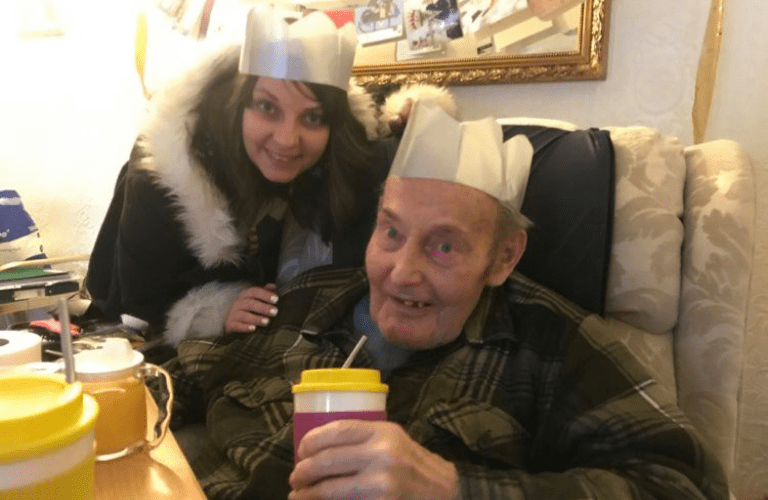
Rachael and her grandad last Christmas.
As part of Dementia UK’s ‘Fix the funding’ campaign that is calling for an urgent review of the NHS continuing healthcare process, Rachael shares her experience of how the process is flawed for people living with dementia.

Rachael and her grandad last Christmas.
We started the application back in October 2019 and the Decision Support Tool (DST) meeting was eventually held in April 2021. There was no one in charge so the initial checklist had to be repeated three times as it was either lost or kept on hold for so long that it expired. I kept chasing but nobody would ring me back.
A number of professionals offered to write statements, including the Parkinson’s nurse, the Speech and Language Team, the dietician and the Frailty Support Team. However, none of these professionals were present at the DST meeting. It was just me, our new Social Worker – who had little knowledge of CHC – and the CHC assessor. Despite the National Framework for CHC clearly stating that a health professional should be involved in the assessment, there was no clinician present, which meant that there was no one to make the case for my grandad’s needs.
We’ve had such a hard time trying to explain Parkinson’s dementia to healthcare professionals, there’s just no knowledge, no support. Grandad was repeatedly marked down because the District Nurses and other professionals did not understand his form of dementia.
I think a lot of healthcare professionals think it’s Alzheimer’s, and if it falls outside of Alzheimer’s, they don’t get it.
We had healthcare professionals tell us that Grandad had full capacity because they didn’t understand that although Grandad’s short-term memory was quite good, his reasoning was really bad. He had paranoid delusions where he strongly believed things like healthcare professionals are conspiring against him – all sorts of things that mean he couldn’t make a rational decision about care.
I have a health and care background and even I found the system hard. You just question yourself. I couldn’t get my point across and was asked to be quiet and let the professionals talk.

Rachael’s grandma and grandad at Christmas, around 12 years ago
Our CHC application was declined because the assessor said Grandad didn’t have a primary health need. I felt the application didn’t allow me to properly articulate how each area interacted with and affected the others, meaning the assessors didn’t understand the complexity of his needs. During the CHC assessment, it’s important to talk about what happens on the person’s worst day – but I think families often feel really embarrassed or discouraged about this and worry that it will be perceived as them not providing the right level of care.
Families also need to have an advocate who understands dementia and how the CHC process works, who can share information and help families to articulate their case.
I don’t think a lot of health and care professionals know enough about CHC, and don’t have enough support. Although our Social Worker was great, she’d never done a DST before and she didn’t understand what she was supposed to be arguing.
We were finally given an appeal date after prompting the assessor once again. It took two years since we first applied for CHC and felt like a constant battle.
Grandad passed away just two weeks before his CHC funding was granted. The CCG finally backed down and admitted that he had a primary health need and should have had funding from the offset.
I have been through so many emotions – anger, embarrassment, exhaustion, pure frustration. I had very little time left with Grandad, and I wasted it arguing with people who were supposed to be helping us.

Rachael’s grandma and grandad on their 50th wedding anniversary
That’s why Dementia UK’s ‘Fix the funding’ campaign is calling on the Government to urgently review the continuing healthcare funding process so that more people with dementia can access the support.
All too often people living with dementia and their families are left to cope alone. Together we can create a better system.